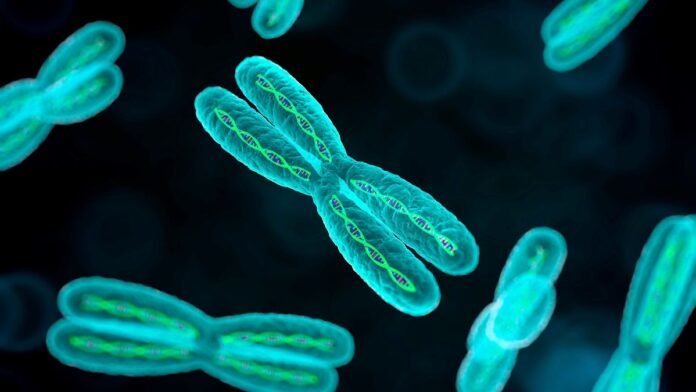Scientists are increasingly concerned about the shrinking Y chromosome, a topic that has intrigued researchers for years. This process resembles your favorite jeans getting smaller with every wash, except that in this case, the shrinkage unfolds over millions of years. While this phenomenon raises questions about the future of male fertility and human reproduction, experts reassure that there is no immediate cause for alarm.
Humans possess 23 pairs of chromosomes. Among these, 22 are autosomes, and one pair determines sex: XX for females and XY for males. The Y chromosome, which plays a crucial role in determining male characteristics, is experiencing a gradual reduction in its number of genes. This trend has been observed over the course of evolutionary history, and researchers are keen to understand its implications.
Dr. Mallikarjun R Patil, a Consultant in Medical Genetics and Personalised Medicine at Aster Whitefield Hospital in Bengaluru, explains that the Y chromosome’s shrinkage is part of a long-term evolutionary process. He describes how the chromosome, which once carried a more extensive array of genes, has been progressively losing them. This reduction impacts various aspects of genetic functions associated with male development and fertility.
The Y chromosome is pivotal in sex determination and the development of male-specific traits. It houses the SRY gene, which triggers the formation of testes and subsequent male characteristics. As the chromosome shrinks, the reduction in gene count raises concerns about its future role. Scientists worry about potential implications for male fertility and reproductive health, as fewer genes could lead to a decrease in sperm production or quality.
The shrinking of the Y chromosome is not a new discovery. Researchers have long been aware that the chromosome has been gradually losing genes over millions of years. The current rate of gene loss suggests that the Y chromosome might continue to shrink, but it is unlikely to disappear entirely in the foreseeable future. Evolutionary pressures and natural selection could potentially offset this decline.
Interestingly, despite the gradual reduction, the Y chromosome has not led to a dramatic increase in reproductive issues among men. This resilience indicates that while the chromosome is shrinking, it still retains essential functions crucial for male reproduction. The human body may have adapted mechanisms to cope with the loss of some of its genes.
Current research aims to understand the broader implications of Y chromosome shrinkage. Scientists investigate whether this reduction affects specific male traits or health conditions. They also explore whether interventions or advancements in medical science might counteract potential negative effects.
For now, there is no immediate need for concern. The shrinking Y chromosome is part of a natural evolutionary process. Researchers continue to monitor the situation to gain a deeper understanding of its long-term effects. As science progresses, new discoveries may shed light on how the Y chromosome’s changes impact male health and fertility.
The gradual shrinking of the Y chromosome is an intriguing aspect of human evolution. While it raises questions about the future of male reproductive health, current evidence suggests that the chromosome still performs its critical functions. Ongoing research will provide further insights into how this phenomenon may influence human biology and health. For the time being, there is no cause for immediate alarm, but the scientific community remains vigilant in exploring this fascinating topic.
Researchers are delving into how the shrinking Y chromosome might impact genetic diversity. With fewer genes on the Y chromosome, there’s a potential risk of reduced genetic variation in males. This reduction could influence overall population health and adaptability. However, the exact consequences are still under study. Scientists are exploring how this might affect not just individual health but also broader evolutionary trends.
Advancements in genetic technology and reproductive medicine could also play a role in addressing potential issues arising from Y chromosome shrinkage. For instance, assisted reproductive technologies (ART) and genetic therapies may help mitigate some of the effects of gene loss. Techniques such as sperm sorting, genetic screening, and in vitro fertilization (IVF) could provide solutions for individuals facing fertility challenges linked to Y chromosome changes.
Furthermore, it’s worth noting that the Y chromosome’s evolution is not occurring in isolation. Other chromosomes are also undergoing changes, and these changes could interact in complex ways with the Y chromosome’s reduction. Studies on other chromosomes might reveal how they compensate for the loss of Y chromosome genes or how their functions might shift over time.
Public awareness and understanding of genetic issues are crucial. Educating people about the Y chromosome and its role in male health can help dispel myths and reduce unnecessary worry. As scientific knowledge advances, clearer communication about genetic health will empower individuals to make informed decisions and address concerns proactively.
While the shrinking of the Y chromosome poses interesting questions and potential challenges, current evidence suggests that the chromosome continues to play its essential role in male development and reproduction. Ongoing research will provide deeper insights into this evolutionary phenomenon and its implications. For now, there is no immediate cause for concern, but continued monitoring and scientific exploration will ensure that any emerging issues are addressed effectively.

